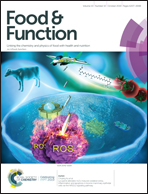Hydroethanolic plant extracts from Cameroon positively modulate enzymes relevant to carbohydrate/lipid digestion and cardio-metabolic diseases
Abstract
Cardiovascular diseases are the greatest cause of death globally and are frequently associated with type 2 diabetes mellitus and metabolic syndrome, a condition including visceral obesity, hypertension, elevated triglycerides and low HDL cholesterol and hyperglycaemia. Several medicinal plants, including spices, are used in Cameroon as herbal medicines and are traditionally employed for the treatment of several ailments such as diabetes and related diseases. In this study, we chemically characterized eleven Cameroonian spice extracts and evaluated their effects on some enzyme activities relevant to carbohydrate and lipid digestion and cardio-metabolic diseases. Hydroethanolic spice extracts were characterized by GC-MS analysis and screened for their ability to modulate the activity of α-glucosidase, α-amylase, pancreatic lipase, 3-hydroxy-3-methylglutaryl-coenzyme A reductase and angiotensin-converting enzyme (ACE). Among the spice extracts tested, those from Xylopia parviflora showed the widest inhibitory spectrum, with a relevant effect on all enzyme activities. Dichrostachys glomerata and Aframomum citratum extracts were more selective. The selected and strong activity of some plants, such as that of Aframomum citratum on pancreatic lipase and that of Xylopia aethiopica on ACE, suggests their specific use in obesity and hypertension, respectively. Chemical analysis indicated that for some spice extracts such as Xylopia parviflora and Aframomum citratum their secondary metabolites (chlorogenic acid, pimaric acid, and catechin and its derivatives) could potentially justify the biological properties observed. Our findings clearly show significant inhibition of cardio-metabolic enzymes by hydroethanolic Cameroonian spice extracts, suggesting the potential usefulness of nutraceuticals derived from these plants to develop novel management strategies for obesity and diabetes complications.



 Please wait while we load your content...
Please wait while we load your content...